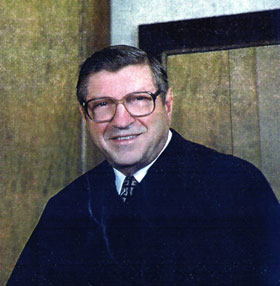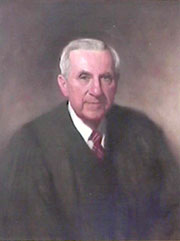 Judge Dale Ihlenfeldt died right after Christmas. He was 92 years old and hadn’t sat on the bankruptcy court bench in Milwaukee for many years, though he remained active until fairly recently, including by teaching an annual CLE program in Madison in which I also participate. Teaching CLE required him to keep up on developments in bankruptcy law, and that suited him just fine, because he loved the law. He also liked lawyers, and his warm, engaging personality was always welcome whenever he could join us.
Judge Dale Ihlenfeldt died right after Christmas. He was 92 years old and hadn’t sat on the bankruptcy court bench in Milwaukee for many years, though he remained active until fairly recently, including by teaching an annual CLE program in Madison in which I also participate. Teaching CLE required him to keep up on developments in bankruptcy law, and that suited him just fine, because he loved the law. He also liked lawyers, and his warm, engaging personality was always welcome whenever he could join us.
I learned a lot from Judge Ihlenfeldt over the years, but one of the most valuable lessons he taught me came very early in my legal career, and I see this story as making an important point for law students and new lawyers. The practice of law requires constant learning; you’ve barely begun to know what you need to know when you leave law school. And you can—must—learn the lessons of the law (and life) from everyone, not just your professors, but your colleagues, your adversaries, your clients, and even from judges.
Back in the mid ’70s, as an associate at Foley & Lardner, I first appeared in bankruptcy court for banks and other creditors, often seeking to recover collateral or to oppose the discharge of a debt. I had appeared before Judge Ihlenfeldt a few times, and on this particular occasion he had ruled against me. I don’t remember the details, but the decision may well have involved the judge’s exercising some discretion, and he exercised it against my client. The case was over, and (as often happened in his court) the lawyers had lingered in chambers to talk. He could tell that I was upset at losing (not then having much experience at it—a condition that time has healed), and he turned to me, in his gentle way, and said, “Oh, Tom, you have to understand that we’re the bankruptcy court. Bankruptcy law is intended to benefit debtors, and you shouldn’t expect to win all the time when you represent creditors.”
This comment struck me at the time and many times since as one of the best lessons that a judge could teach a young lawyer. And it has implications beyond bankruptcy law. Good judges like Judge Ihlenfeldt call them as they see them and follow the law as they understand it. But a lawyer should never lose sight of the fact that much of the law (understood as being what judges do) is not black and white, but gray, and a judge’s instincts in the gray area—whether to afford a debtor relief, to let a plaintiff try to prove her case, or to cut a lawyer some slack—are every bit as much a part of the law as the stuff in the books. I’m glad that I learned that lesson early from a great judge.
 Tom Shriner’s recent remembrance of Judge Dale Ihlenfeldt said to law students and new lawyers that “you can—must—learn the lessons of the law (and life) from everyone, not just your professors, but your colleagues, your adversaries, your clients, and even from judges.” This last (neatly phrased) is the case, in my estimation, both of judges whom one knows and of others whom one has never met. One should collect judges, as Tom and I say to the students in our courses.
Tom Shriner’s recent remembrance of Judge Dale Ihlenfeldt said to law students and new lawyers that “you can—must—learn the lessons of the law (and life) from everyone, not just your professors, but your colleagues, your adversaries, your clients, and even from judges.” This last (neatly phrased) is the case, in my estimation, both of judges whom one knows and of others whom one has never met. One should collect judges, as Tom and I say to the students in our courses.
 Judge Dale Ihlenfeldt died right after Christmas. He was 92 years old and hadn’t sat on the bankruptcy court bench in Milwaukee for many years, though he remained active until fairly recently, including by teaching an annual CLE program in Madison in which I also participate. Teaching CLE required him to keep up on developments in bankruptcy law, and that suited him just fine, because he loved the law. He also liked lawyers, and his warm, engaging personality was always welcome whenever he could join us.
Judge Dale Ihlenfeldt died right after Christmas. He was 92 years old and hadn’t sat on the bankruptcy court bench in Milwaukee for many years, though he remained active until fairly recently, including by teaching an annual CLE program in Madison in which I also participate. Teaching CLE required him to keep up on developments in bankruptcy law, and that suited him just fine, because he loved the law. He also liked lawyers, and his warm, engaging personality was always welcome whenever he could join us.